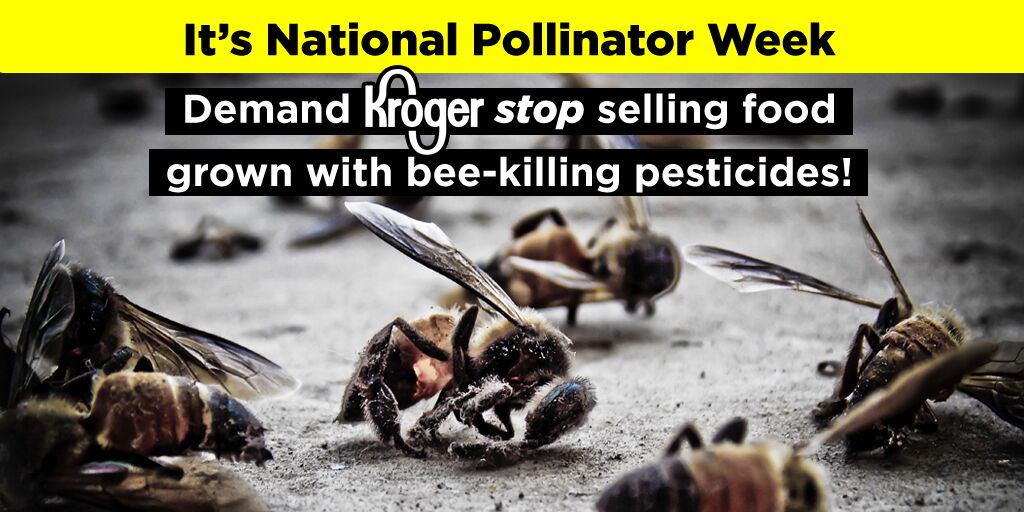20
Jun
Customers Demand Kroger Stop Selling Food Grown with Bee-killing Pesticides
 (Beyond Pesticides, June 19, 2019) To mark National Pollinator Week (June 17-23), more than 10,000 people across the country are joining to demand that Kroger (NYSE: KR) help stop the extreme decline of pollinators. Customers are delivering letters to stores asking the nation’s largest conventional grocery store to eliminate pollinator-toxic pesticides from its food supply chain and increase domestic organic food offerings to help stop the catastrophic decline of pollinators and other insects.
(Beyond Pesticides, June 19, 2019) To mark National Pollinator Week (June 17-23), more than 10,000 people across the country are joining to demand that Kroger (NYSE: KR) help stop the extreme decline of pollinators. Customers are delivering letters to stores asking the nation’s largest conventional grocery store to eliminate pollinator-toxic pesticides from its food supply chain and increase domestic organic food offerings to help stop the catastrophic decline of pollinators and other insects.
Pollinators and other insects could go extinct within a century, threatening a “catastrophic collapse of nature’s ecosystems,” the first comprehensive global meta-analysis of insect decline states. This is largely due to the widespread use of neonicotinoids and other toxic insecticides in industrial agriculture.
“Systemic neonicotinoid insecticides and the broad range of pesticides that harm people and pollinators have no place in our food supply,” said Drew Toher, community resource and policy director at Beyond Pesticides. “Kroger customers are asking the company to be part of the solution to the pollinator crisis by eliminating hazardous pesticides and expanding organic options.”
“To avoid the ‘bee apocalypse’ it is critical that Kroger immediately commit to stop selling food with pollinator-toxic pesticides,” said Tiffany Finck-Haynes, pesticides and pollinators program manager at Friends of the Earth. “Kroger’s food supply chain is at risk if it does not take immediate action.”
Kroger lags behind its competitors on pesticide reduction. Costco updated its pesticide policy to encourage suppliers of fruits, vegetables and garden plants to phase out the use of chlorpyrifos and neonicotinoids, which will reduce farmworker and pollinator exposure.
“We ask Kroger to show leadership in corporate responsibility by adopting food safety policies that eliminate pesticides in the supply chain that are harmful to people and pollinators,” said Alexis Luckey, executive director, Toxic Free North Carolina.
In February, Friends of the Earth and allies released a report that found Kroger’s store-brand foods contain pollinator-toxic pesticides including glyphosate, organophosphates and neonicotinoids. A 2018 scorecard from Friends of the Earth found that most top food retailers, including Kroger, are failing to safeguard pollinators, like bees, and people from toxic pesticides.
“Bees and other pollinators are responsible for one out of three bites of food. By sourcing food grown with bee-killing pesticides, Kroger is threatening the future of food itself. It’s time for Kroger to protect pollinators by reducing pesticides in its supply chain,” said Katie Reilly, campaign manager at SumOfUs.
On average, beekeepers have lost 40 percent of their hives over the last decade and monarch butterflies have declined by more than 90 percent in under 20 years. The United Nations’ Food and Agriculture Organization published a report warning that the diminishing state of the world’s biodiversity jeopardizes our food security, nutrition, environment and more.
“Maryland beekeepers have lost an unsustainable 60% of hives in recent years. The unprecedented mass die-offs of pollinators and other insects, as well as the rise in cancer, neurological diseases and autism, are clear indicators that the chemical-intensive industrial food system and the poisons applied to our foods are anything but life-giving,” said Bonnie Raindrop, legislative chair of Central Maryland Beekeepers Association.
What you can do today to take part in pushing the largest grocery retailer to go organic and save pollinators:
- Swarm the phone lines: Call Kroger at 800-576-4377. Ask them to stop selling produce grown with pollinator poisons and offer organic options instead.
- Spread the buzz on social media – share messages such as:
- @Kroger brand food is grown with toxic pesticides that are driving the insect apocalypse. Tell Kroger to #SaveTheBees & our food system by phasing out food with bee-killing pesticides!
- Pollinators contribute more than 24 billion dollars to the US economy — and @Kroger has the power to save them from the brink of extinction. Tell Kroger to stop selling food with bee-killing pesticides and increase their organic offerings! #SaveTheBees
- Deliver a letter in person to your local store.
- Link to letter (Print and sign!)
- Find a store near you
- Ask to talk to a manager and tell your story! Explain why the need to protect pollinators matters to you as a customer and as a concerned citizen.
All unattributed positions and opinions in this piece are those of Beyond Pesticides.
Source: Friends of the Earth











Please eliminate the pollinator-toxic pesticides you are using from your food supply chain immediately and introduce domestic organic food offerings to help stop the catastrophic decline of pollinators and other insects. We must avoid a catastrophic collapse of nature’s ecosystems. Thank You,
May 9th, 2022 at 1:42 pmPatricia Larkin